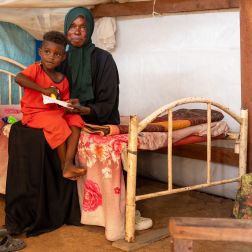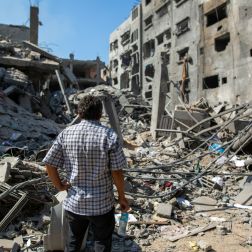- 6 mins read time
- Published: 1st September 2017
Helping a Yemeni village fight hunger
Yemen is on the brink of famine after two years of devastating conflict. So far thousands of people have been killed and over 3 million forced to flee their homes. More than half of the country is without enough to eat. We are delivering emergency aid but we urgently need your help to do more.
We drive west through steep rocky terrain, dotted with ancient mountain-top fortresses studded with tall circular towers of rough-hewn stone. Rural Yemen is serene, isolated and medieval. We are heading from Oxfam’s emergency humanitarian office in Khamer, in the northern tribal heartland of Amran governorate, to Othman village on its western edge.
Othman’s 200 families are battling hunger, like many others across Yemen.
 Othman village, in Yemen’s Amran district, where 200 families are fighting hunger. Credit: Mohammed Farah Adam/Oxfam
Othman village, in Yemen’s Amran district, where 200 families are fighting hunger. Credit: Mohammed Farah Adam/Oxfam
A perilous drive
The drive is nerve-wracking. Our driver Abdullah says pointedly he has been driving for 10 years around these hairpin turns and vertical cliff-face drops. I think he’s noticed how scared I am.We wave to some men and women working the tiny cultivated terraces, and to curious child shepherds moving goats and sheep through the sun-baked mountains. We lose mobile phone reception and modern-day communication. After one and a half hours of a perilous ride over 27 kilometres, we descend into a valley dotted with fields of sorghum (a type of cereal), and to a hamlet of scattered stone dwellings in the cliffs high above the valley floor. This is Othman village.
Food is scarce
Othman’s people eke out life in stricken conditions. Food is mostly home-made bread and a boiled wild plant known locally as Cissus or Hallas. We’re here to measure how Oxfam’s cash assistance project of €81/£76 per month for each extremely poor family has helped put food on their tables and avert starvation.  Boiled, the wild plant Cissus – or Hallas as it is locally known – is the main food along with home-made bread that people eat in Osman village. Credit: Mohammed Farah Adam/Oxfam There were 80 severely malnourished children in Othman. Oxfam set up cash assistance projects around the Khamer district, with other agencies, to buttress their battle against starvation. The children got health treatment from our partners, while Oxfam gave cash to the most desperate of the families here. We also ran a programme to raise their awareness about malnutrition and good hygiene.
Boiled, the wild plant Cissus – or Hallas as it is locally known – is the main food along with home-made bread that people eat in Osman village. Credit: Mohammed Farah Adam/Oxfam There were 80 severely malnourished children in Othman. Oxfam set up cash assistance projects around the Khamer district, with other agencies, to buttress their battle against starvation. The children got health treatment from our partners, while Oxfam gave cash to the most desperate of the families here. We also ran a programme to raise their awareness about malnutrition and good hygiene.
No teachers for the schools
At Othman school, a frail old man whirls black prayer beads through his fingers, leaning against the wall of a classroom. The school rooms are now only used for community meetings. There are no teachers in Othman. The village announcer shouts out over the loudspeaker: “Oxfam is here to monitor the conditions of the malnourished children.” Curious folk join us. Parents have dressed their children, who before had been on the brink of death, in their very best clothes. They seem well on the mend. Over the four-month duration of our cash assistance project in Othman we’ve reduced malnutrition by 62%. Though pale, these children are no longer on the verge of starvation.
You’ve saved our lives
Nine-month-old Mohamed Amin, the youngest of five siblings and still tiny, is cradled by his father. He has certainly been saved from an early unnecessary death, by a small assistance. Crammed into a classroom, we ask about Oxfam’s work. How many times do you eat a day? How is the baby’s condition? What do you do for a living? And so on.  Rabee Qassem holds his young daughter while worrying for her future. He's one of thousands that used to receive Oxfam's cash assistance in Amran governorate. Credit: Mohammed Farah Adam/Oxfam Children smirk at my Arabic as their parents take turn in answering. Others nod along. “Your assistance saves our lives,” says Rabee Qassem, holding his young daughter.
Rabee Qassem holds his young daughter while worrying for her future. He's one of thousands that used to receive Oxfam's cash assistance in Amran governorate. Credit: Mohammed Farah Adam/Oxfam Children smirk at my Arabic as their parents take turn in answering. Others nod along. “Your assistance saves our lives,” says Rabee Qassem, holding his young daughter.
The effects of war
Many of these villagers used to work on small farm plots along the valley but their incomes were so meagre they could no longer afford their essential needs when the price of basic commodities skyrocketed due to the conflict and the de-facto blockade of Yemen. Since the war exploded open in March 2015, more than 10,000 Yemenis have been killed and 17 million people – 60 percent of the population – do not now have enough to eat. More than 7 million of them are a step away from famine. As they were here in Othman.
Hope for peace
I ask the mother of 10-month-old Marwan about her hopes. She takes a deep breath, a moment of silence as she gathers her thoughts, and tears well up. “Peace! My only hope is peace,” she says. Others nod. At the end of our meeting, I had to announce the news. “We have run out of money to continue the cash assistance.” Their banter dies down to silence. “But why? Our situation is still miserable,” Mohamed Amin’s father says. “The cash assistance project was funded by donors for only a specific period of time, which has come to an end. We are still looking for more donor funds but we haven’t secured any yet,” I explain. “We know your situation and we are doing our best.” “Thank you. God will help,” says the old man with the beads.  An Oxfam water distribution point. Photo: Moayed Al.Shaibani/Oxfam It is a wretched time. Our programme was funded for four-months and – although this was made clear at the start – the people of Othman are dismayed now and afraid. It’s my job to start winding-down this part of our work now that we only have a month left of funding toward it. We hoped to maintain it. We tried. It saved their lives. But the cruel truth is that earlier this year, the big aid donors made the tough decision to triage their money only to governorates that were at “level 4” emergency status – that is, one level below famine. Although still itself in an emergency situation as a village, Othman is part of a governorate – Amran – that is classified overall as “level 3”. Therefore, there are other governorates which are, overall, in worse straits. Othman no longer makes the cut. This is exactly what we mean when we say Yemen is an “overwhelming” crisis. Our unconditional cash transfer projects are immediate life-savers; last year Oxfam ran cash transfer projects worth nearly €3.3 million/£3 million, to more than 7,100 families in Yemen (the Othman project cost about €27k/£25k, by way of example). But these are typically short-term and irregular projects, and with the constant funding pressure we’re forced to keep tightening our criteria of people we can help to only the most desperate.
An Oxfam water distribution point. Photo: Moayed Al.Shaibani/Oxfam It is a wretched time. Our programme was funded for four-months and – although this was made clear at the start – the people of Othman are dismayed now and afraid. It’s my job to start winding-down this part of our work now that we only have a month left of funding toward it. We hoped to maintain it. We tried. It saved their lives. But the cruel truth is that earlier this year, the big aid donors made the tough decision to triage their money only to governorates that were at “level 4” emergency status – that is, one level below famine. Although still itself in an emergency situation as a village, Othman is part of a governorate – Amran – that is classified overall as “level 3”. Therefore, there are other governorates which are, overall, in worse straits. Othman no longer makes the cut. This is exactly what we mean when we say Yemen is an “overwhelming” crisis. Our unconditional cash transfer projects are immediate life-savers; last year Oxfam ran cash transfer projects worth nearly €3.3 million/£3 million, to more than 7,100 families in Yemen (the Othman project cost about €27k/£25k, by way of example). But these are typically short-term and irregular projects, and with the constant funding pressure we’re forced to keep tightening our criteria of people we can help to only the most desperate.
Stand with Yemen
Over the last two years, Oxfam has provided humanitarian assistance to more than 130,000 people in the most dire humanitarian needs in Khamer and in three other neighbouring districts. We enable vulnerable communities to access water through the rehabilitation of rural and urban water networks. We’ve invested in rain-water harvesting, repaired water networks, and provided fuel, sanitation services, solid waste management and hygiene promotion. We’ve given out winter clothes to families living in open displacement camps, helping their children to survive freezing weather. With heavy hearts, we leave Othman and its children and their parents. Oxfam is still running a cholera response project there, including distributing hygiene kits, but our cash assistance work in Othman is done – at least for now – decided for us, because there are “worse” priorities elsewhere. I hope Othman’s people survive. I hope they can eventually thrive. I hope that donors can find more funding and expand the humanitarian work to the scale it needs to be, including back into the pockets of desperation like Othman. I hope Yemen can achieve peace.




